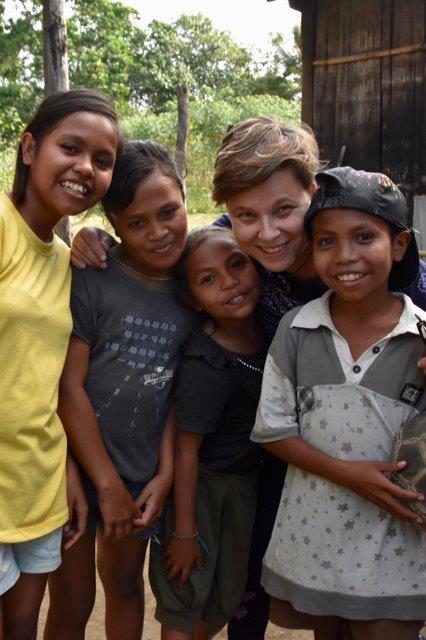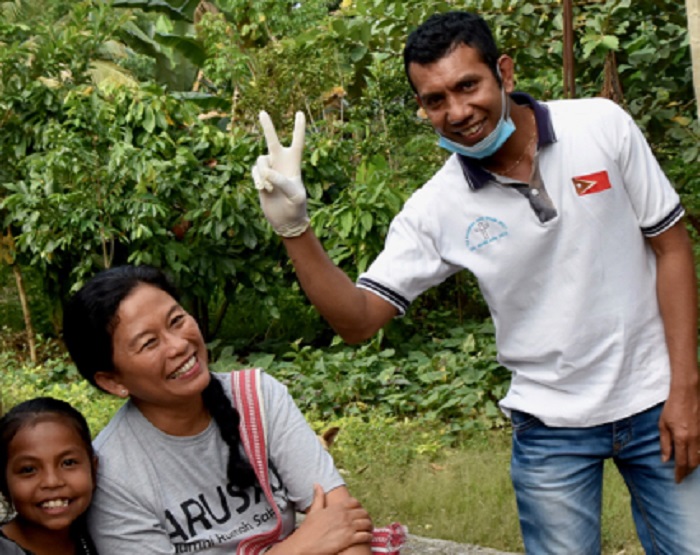Doesn’t matter where you are in the world, there’s something about Swedish blondes in flares. The moment I find ABBA’s ‘Dancing Queen’ in my playlist, smiles light the faces of my four young companions and for a brief moment during the chorus, we’re in perfect sync. At the other end of the clinic, our photographer and videographer bust a few moves in between the serious business of filming the testimony of clinic manager Albert, who has limited English and dreams of a blood pressure machine for his patients.
Same (‘Sar-may’) is five hours north of Dili, Timor Leste. It’s a beautiful place – mist shrouded mountains, rivers that wind their way through rainforest and bougainvillea that rambles free. Children play soccer beside the road; chickens and piglets wander onto the verge. It’s cooler here too – a respite from the humidity of Dili and the fierce red valleys where not much grows. Sitting beside these four children, with their radiant smiles and eager refrains, it’s easy enough to feel at home.
These kids speak Tetum, reasonable Bahasa, some Portuguese and a handful of English phrases. Top of the pile is ‘hello’ and ‘Facebook’. They have no access at home, but at school there’s the internet, and by the time I get back to Australia we’re connected. Friends.
Hidden, for now, is the tuberculosis. The malaria. The bare dirt floors, lack of electricity, one raised wooden platform for a bed, no running water, open fire for cooking. Hidden are the 150 000 bodies massacred or starved during the Indonesian occupation between 1975-1992, just 700 kilometres from Darwin.
Unseen: the quiet heroism of the Uniting Church in Australia’s partner church, the Protestant Church in Timor Larosaé, advocating for her people, shepherding, playing a role behind the scenes internationally. Hidden are the long years of determination; men and women who refused to sacrifice their country’s identity but were forced to give up almost everything else. And hidden, up until we are sitting among them eating their corn, is the fact that this family have given us everything they have to sustain them for a week, and will quietly go hungry because of their generosity.
This is life in Timor Leste.
In the lead up to Christmas, and as I prepare to help launch UnitingWorld’s ‘Everything in Common‘ Ethical Gift Campaign, it’s challenging to reflect on Paul’s words in Acts once again. Of the early church, Paul writes: “And all who believed were together and had all things in common. And they were selling their possessions and belongings and distributing the proceeds to all, as any had need.”
This was a group of people willing to pool their stuff, sell it and give away the proceeds to whoever needed it. In recognition of ‘all they had in common’, they literally held ‘all things in common’ – and gave willingly from the shared pot. That’s fairly mind-blowing.
 For the church in Timor, and the family I’ve just met, perhaps Paul’s words in Acts are not quite the embarrassing challenge they are to us: when every day requires trust, maybe sharing what you have is learned over countless sleepless nights of hunger on which the sun still rises. Or maybe it’s every bit as challenging and the reality of need just compels these families to give anyway. What’s unmistakeable is that in this impoverished place – the poorest in South East Asia, where almost 60% of people live below the poverty line – generosity flourishes. Crippled by disease and malnutrition and the weight of their own bloody history, these people of Timor Leste open their hands and hearts to one another and to us, strangers, and give us food, their stories, and songs that somehow translate across the globe.
For the church in Timor, and the family I’ve just met, perhaps Paul’s words in Acts are not quite the embarrassing challenge they are to us: when every day requires trust, maybe sharing what you have is learned over countless sleepless nights of hunger on which the sun still rises. Or maybe it’s every bit as challenging and the reality of need just compels these families to give anyway. What’s unmistakeable is that in this impoverished place – the poorest in South East Asia, where almost 60% of people live below the poverty line – generosity flourishes. Crippled by disease and malnutrition and the weight of their own bloody history, these people of Timor Leste open their hands and hearts to one another and to us, strangers, and give us food, their stories, and songs that somehow translate across the globe.
It’s hard not to compare this with our own culture, where this Christmas we’ll spend $8.8 billion on Christmas gifts, many of which end up in landfill. Even our own best attempts to cut back on spending – to buy ethical gifts, to consume less ostentatiously – will probably seem hopelessly inadequate compared with the kind of need, and the kind of generosity, we often see in the world around us.
It might be tempting to give up and decide it’s all hopeless. Yet even small things do make a difference.
The work of our partner’s clinic – through the ‘Healthy kids’ gift you can purchase from UnitingWorld’s Everything in Common – spared two-year-old Caleb when his mum contracted tuberculosis here in Same late last year. When his family had nothing to eat but corn grown in their own garden, Albert and the clinic staff brought them milk, rice and other vegetables to strengthen their immunity, provided Maria with the medication she needed and helped the entire family work together to prevent the spread of disease. That’s a simple gift in action that saved lives. Today, we’re sitting together in a clinic that gives hope and brings change to hundreds of people, stumbling through some shared ABBA, off the back of gifts given through Everything In Common. Every small intervention matters.
Our dream is of a world where we recognise all we have in common, and share it so that every person has the chance to thrive.
That dream begins with stories told of people and places who are more like us than we first imagined; it grows with the determination to resist the lure of a society that says we can never have enough; it thrives on acts of everyday giving that put resources into the hands of people who are strong and creative enough to overcome the challenges they face if they’re given the chance.
Please join us at everythingincommon.com.au – find out how your local community can share the love by contacting us on 02 82674267 for more info.
Cath Taylor, UnitingWorld
